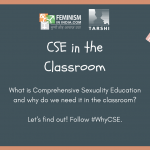 Editor’s Note: Feminism in India in collaboration with TARSHI have launched a campaign ‘#WhyCSE – CSE In The Classroom’ to emphasize the need for Comprehensive Sexuality Education in schools. Read more about the campaign here.
Editor’s Note: Feminism in India in collaboration with TARSHI have launched a campaign ‘#WhyCSE – CSE In The Classroom’ to emphasize the need for Comprehensive Sexuality Education in schools. Read more about the campaign here.Posted by Akanksha Misra
“I have not got it [sexuality education] from my family, not from my teachers…no one you know who teaches you values”. This statement succinctly captures the heart of the debates surrounding sexuality education. Beginning from childhood, education on ‘moral’ values begins at home: rid yourself of lust (vasna), wash your body before you pray and privilege reasoning over desire.
Growing up as a teenager in ’90s India, I too experienced biology teachers skipping the chapter on reproduction and remember the embarrassment on my father’s face when I asked him as a 12-year-old, “so how do the sperm and egg meet to create a zygote?” Moral panic around sexuality education by those who vehemently oppose it has been hashed out multiple times, and it is not my intention to revisit them.
As a researcher in this field, having read the literature on the issue that repeatedly highlights the ill-preparation and opposition of teachers to CSE on grounds of morality, I was 100% sure of hearing the same old cultural arguments when I came to India. For example, “this is not in our culture”, “we as Indians are not prepared for this kind of education”, “we are teachers, how can we talk about sex?” and so on. However, I was pleasantly surprised.
Over the course of my preliminary fieldwork, I have heard the whole gamut of cultural and moral arguments. But there are a small group of teachers that I have come across in my travels from Hyderabad to Delhi and back that are radically altering the binary distinction between sexuality and morality through their own classroom pedagogical practices. These are teachers vocally demanding CSE in classrooms and while it remains off the books officially, they are improvising and incorporating sexuality education in their lessons. Most interestingly, they firmly believe that they are imparting moral education to their students.
Growing up as a teenager in ’90s India, I too experienced biology teachers skipping the chapter on reproduction.
Neeta works as a biology teacher for a government school in Delhi. She rolls her eyes at the sight of this America-returned researcher who asks the predictable question, “So why according to you is sexuality education considered immoral in our country?” I have obviously based this ill-framed and insensitive question on the assumption that sexuality is immoral for most teachers (especially a government school one!) and am half expecting Neeta to walk me through the usual cultural arguments.
What she says takes me by surprise. “Look”, she says, “what is this houa [big deal] around our bodies and sex? You are coming from Amrika [America] and want answers. I will tell you. For me teaching about the body is the most noble, moral job.” “Oh really?” is the best I can manage and as my voice trails off, she continues. “Look, how do we come to school? We bring our minds to schools in our bodies right? We need to eat healthy to think…Our PM asks us to do Yoga to build a strong body. Then why be ashamed of it? I love my body. When I teach changes in puberty, I point to my own body parts…sure they giggle, but they learn that it’s normal!”
Over several cups of chai and laughter, Neeta finally delivers her punchline, “Look bhai, who is a moral person? Once we appreciate our bodies and learn that sex, food, and urination are normal, morality follows. We understand why it is morally wrong to violate others’ bodies, to abuse children, and when to stop when someone says NO. So now you see how I am giving moral education?” She smiles.
Many kilometres down south in Hyderabad, in a drastically different setting, I am ensconced in a comfortable room with the social activities coordinator of an up and coming international school. Whilst the school desperately seeks CSE to brand itself as a progressive institution, Janaki’s genuine investment in CSE is unmistakable. She passionately regales me with anecdotes from her past as an English teacher when she pushed her students to analyse characters in stories and always problematised female depictions.
“Why don’t we hear the voice of the mother in this story, I would ask them”, says Janaki, “or what is a beautiful body and so on.” “What motivated you to have students think about these issues?” I ask. Janaki pauses and then says, “They must. We tend to accept what is taught to us… for example, don’t show your bra strap, and so on. When you ask why, ‘Because that’s the proper way’…and this is what we learn is being a good, moral person. But a good person also has to see what is wrong and understand others’ suffering. For me, it was important to teach this…to make them [students] question…”
These are teachers vocally demanding CSE in classrooms and incorporating sexuality education in their lessons.
Janaki’s intervention here, to educate children to question oppression such as policing women’s bodies through the control of even their most intimate item of clothing such as the bra, that gets passed off as teaching morality and decency, is a poignant one. As a teacher myself, I am touched by Janaki’s passion. As a student, I would have loved to have someone like her as my teacher, to have been given the language to articulate sexism, violence and oppression; language that I learned much later in life at the expense of huge personal trauma and sorrow.
As I left my meetings with both Neeta and Janaki, my ego as an America-returned researcher rightfully deflated, I realised how much more complicated the situation in schools really is than what policy reports capture. My enthusiasm as an educator had been revived and my faith that we can make positive changes in young lives reaffirmed. At the same time, I felt immense frustration at the lack of formal CSE to support educators like them. Janaki and Neeta are not responding to a vacuum—they both repeatedly emphasised students’ need to learn and curiosity about sexuality. And through their practice they show us that teaching sexuality is also a moral pursuit.
Also Read: Why Do We Need CSE In Our Classrooms? An Educator’s Perspective | #WhyCSE
All names have been changed to maintain anonymity.
Akanksha is a doctoral candidate at the Department of Gender, Women and Sexuality Studies, University of Washington, Seattle. She is currently on an American Institute of Indian Studies fellowship to conduct her research on desire, sexuality and citizenship in schools in India and Turkey. She loves traveling, dancing and reading and is based in Secunderabad with her spouse and two kids.
Featured Image Credits: Thriving Family
About the author(s)
Guest Writers are writers who occasionally write on FII.




